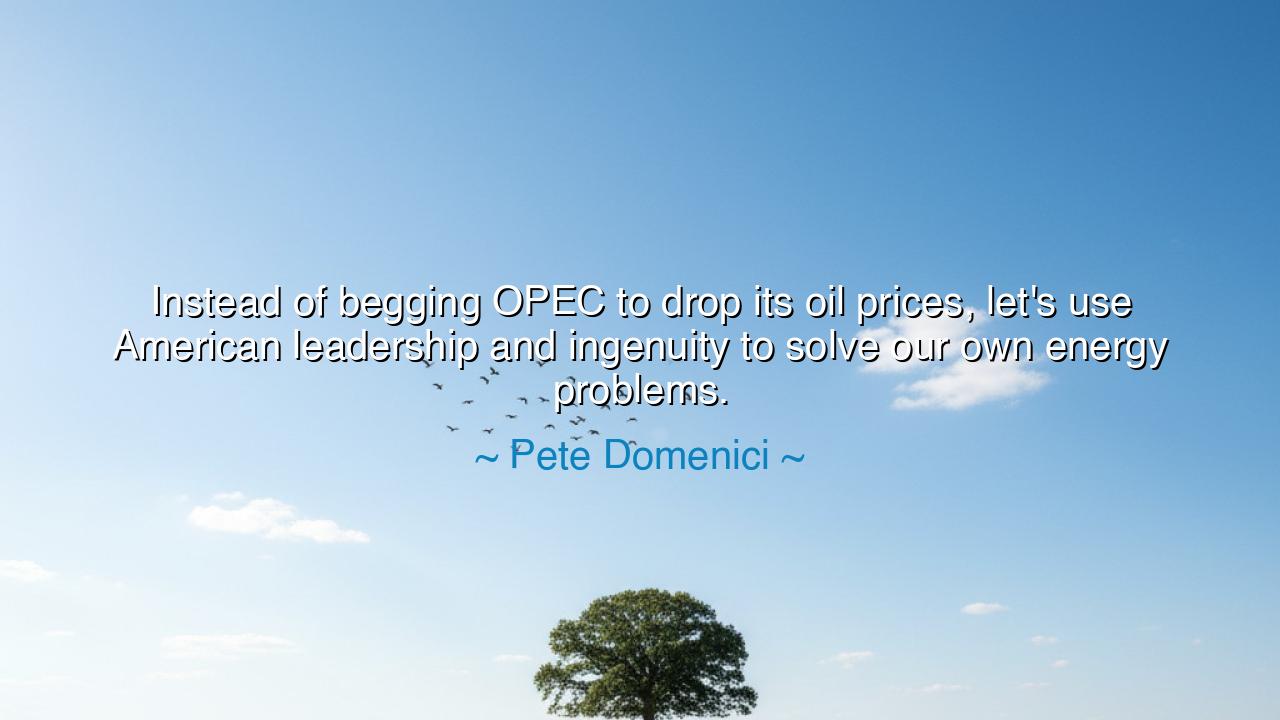
Instead of begging OPEC to drop its oil prices, let's use
Instead of begging OPEC to drop its oil prices, let's use American leadership and ingenuity to solve our own energy problems.






The words of Pete Domenici ring with the defiance of a free people: “Instead of begging OPEC to drop its oil prices, let’s use American leadership and ingenuity to solve our own energy problems.” Here speaks not merely a statesman, but a voice that calls nations to rise above dependency and weakness. He warns against the posture of supplication—begging at the feet of foreign powers for relief—and instead commands a turn inward, toward the strength that comes from leadership and ingenuity. His words are not about oil alone; they are about the eternal struggle between reliance on others and the forging of one’s own destiny.
For what is a nation, if not a living soul? And just as a man is diminished when he surrenders his will to another, so too is a nation weakened when it entrusts its survival to the whims of strangers. Domenici spoke at a time when the power of OPEC weighed heavily upon the world, when the lifeblood of economies—energy—was held hostage by the decisions of distant rulers. Yet he saw beyond the crisis to the greater truth: that the measure of a people is found not in what they beg for, but in what they create.
History confirms this. Recall the energy crisis of the 1970s, when long lines of cars snaked around American gas stations, when tempers flared and doubt gnawed at the nation’s spirit. Many looked outward, pleading for relief from OPEC’s grip. But others turned inward, seeking new paths. From that crucible arose greater investment in efficiency, in alternative sources, and in a deeper awareness that dependence carried chains heavier than steel. Domenici’s words capture this lesson: that adversity is not a call to despair, but a summons to innovation.
We see a parallel in the story of Thomas Edison, who in the darkness of the nineteenth century brought forth the electric light. He did not beg the night to be less dark, nor plead with the stars to shine brighter. He harnessed his mind, his tools, his perseverance, and transformed the problem into a triumph. So too must nations face their challenges: not by stretching forth empty hands, but by filling them with the instruments of creation.
Thus Domenici points to a greater principle: that the spirit of leadership and the fire of ingenuity are the true treasures of a people. Oil prices rise and fall, fortunes shift, alliances change—but the creative power of a nation endures, if only it chooses to cultivate it. To rely on others for rescue is to be forever a servant; to rely on one’s own strength is to secure freedom. This is not only economic wisdom—it is moral wisdom, for it speaks of dignity, of courage, of self-reliance.
The lesson is plain: in our own lives, let us not be beggars of circumstance. When hardship comes, do not wait upon the mercy of others; instead, awaken your own ingenuity. Ask not, “Who will rescue me?” but rather, “What strength lies within me that I have not yet summoned?” In the household, in the workshop, in the fields of labor, this same principle holds. To create, to innovate, to lead—these are the shields against dependence and the tools of freedom.
Therefore, let us act. Support the thinkers, the builders, the inventors who labor to find new answers to old problems. Cultivate discipline in energy, in resources, in life itself. Do not squander what is scarce, but seek new ways to transform it. And above all, cherish the spirit of self-reliance, for it is the foundation of both personal liberty and national greatness.
For in the end, Domenici’s cry is eternal: do not beg for mercy from beyond your gates—rise instead with leadership and ingenuity. Nations that beg are bound; nations that create are free. So too with men. The world does not await the beggar—it follows the creator. Let us, then, be creators.






AAdministratorAdministrator
Welcome, honored guests. Please leave a comment, we will respond soon